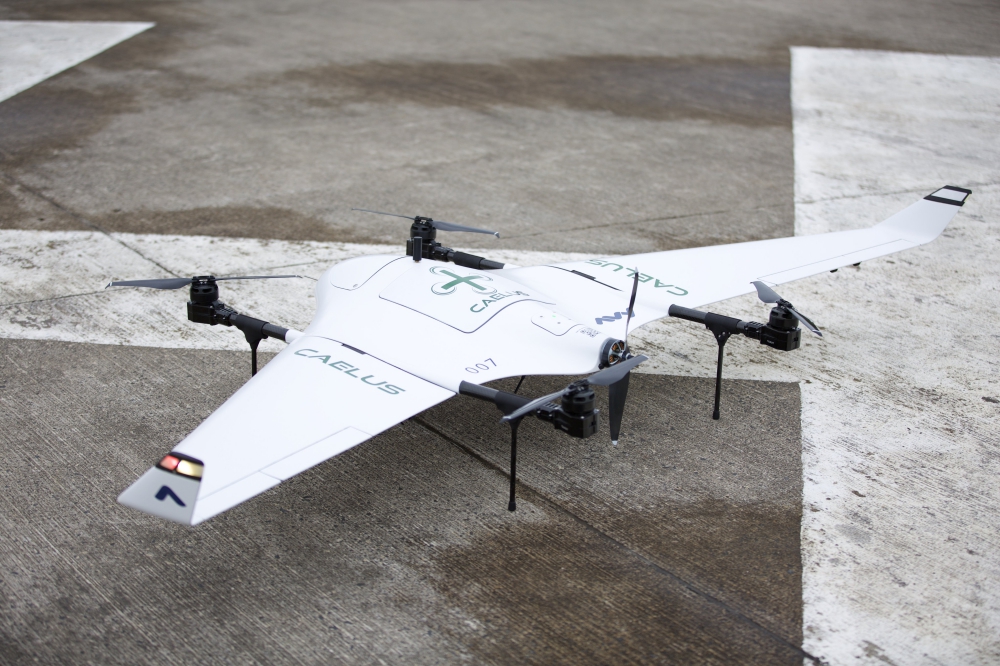An investigation has been carried out into a ‘serious incident’ which saw a drone undergoing trials in the grounds of a Scots hospital plummet 50 metres from the sky.
The drone was undergoing a demonstration flight at Arran War Memorial Hospital on the island of Arran on May 6 this year as part of a project to develop the UK’s first medical drone network in Scotland.
The CAELUS (Care & Equity – Healthcare Logistics UAS Scotland) project, which launched in December 2020, will see drones used to transport essential medicines, blood, organs and other medical supplies throughout Scotland.
AGS Airports, which owns and manages Aberdeen, Glasgow and Southampton airports, is leading the consortium developing and trialling the drone network in partnership with NHS Scotland, alongside other partners including the University of Strathclyde and leading air traffic control provider NATS.
The incident has come to light following a newly-published report by The Air Accidents Investigation Branch (AAIB), which investigates civil aircraft accidents and serious incidents within the United Kingdom.

Avy Aera 1.5
The report notes that the drone, a fixed wing Avy Aera 1.5 model, was hovering at “between 50-65 metres” during the demonstration flight while being flown in various manual modes “when a rhythmic, lower than normal sound was heard emanating” from it.
The drone then “dipped and spiralled downwards during which control could not be re-established” before it “hit the ground and was severely damaged”.
The report also notes that “a fatigue failure of a blade attachment bolt caused one of the lift propeller blades to detach in flight”.
After the accident, an examination of the drone found that a blade of one of the lift propellers had detached from its hub in flight, after the nut and bolt which held the blade in position failed near the interface of the plain shank and threaded portion of the bolt.
A subsequent investigation by the manufacturer of the bolt in question concluded that it had failed due to fatigue within the threaded portion under the nut with further investigation identifying the probable causes of the fatigue failure of the bolt to lie with the design of the propeller and the loads they encounter in flight.
The report confirmed that, as a result of the accident, the manufacturer, Netherlands-based aircraft manufacturer Avy, “is carrying out a review of propeller designs for drones under its development”.
A spokesman for The CAELUS project confirmed to The Herald that no-one was injured and no damage to property was sustained as a result of the incident.
He said:
“We can confirm that an incident took place during a series of live drone demonstrations in the grounds of Arran War Memorial Hospital on 6 May. The purpose was to trial equipment in a safe and controlled environment as per CAA regulations.
There were no injuries or damage to property as a result and the project team conducted a thorough investigation.
CAELUS is an important project which has the potential to completely revolutionise the way in which healthcare services are delivered in Scotland.
The CAELUS partners will take on board the safety recommendations from the report as part of the trial project.”
Since securing £1.5million in January 2020, the CAELUS consortium has designed drone landing stations for NHS sites across Scotland and developed a virtual model of the proposed delivery network which connects hospitals, pathology laboratories, distribution centres and GP surgeries across Scotland.
Back in August, CAELUS secured a further £10.1 million funding from the Future Flight Challenge at UK Research and Innovation to move onto the next phase of the project.
NHS Scotland has said it will bring its “Once for Scotland” approach to the project, the second phase of which will involve live flight trials and removing remaining barriers to safely using drones at scale within Scotland’s airspace.
A key aspect of the project will be designing pathways to ensure the drones can safely share airspace with civil aviation, as well as developing the ground infrastructure needed to recharge the drones.
The project will also ensure critical aspects such as public safety, security and noise levels are considered.
It is scheduled to run until June 2024.
The full 4-page Report can be accessed here.
Source: The Herald

